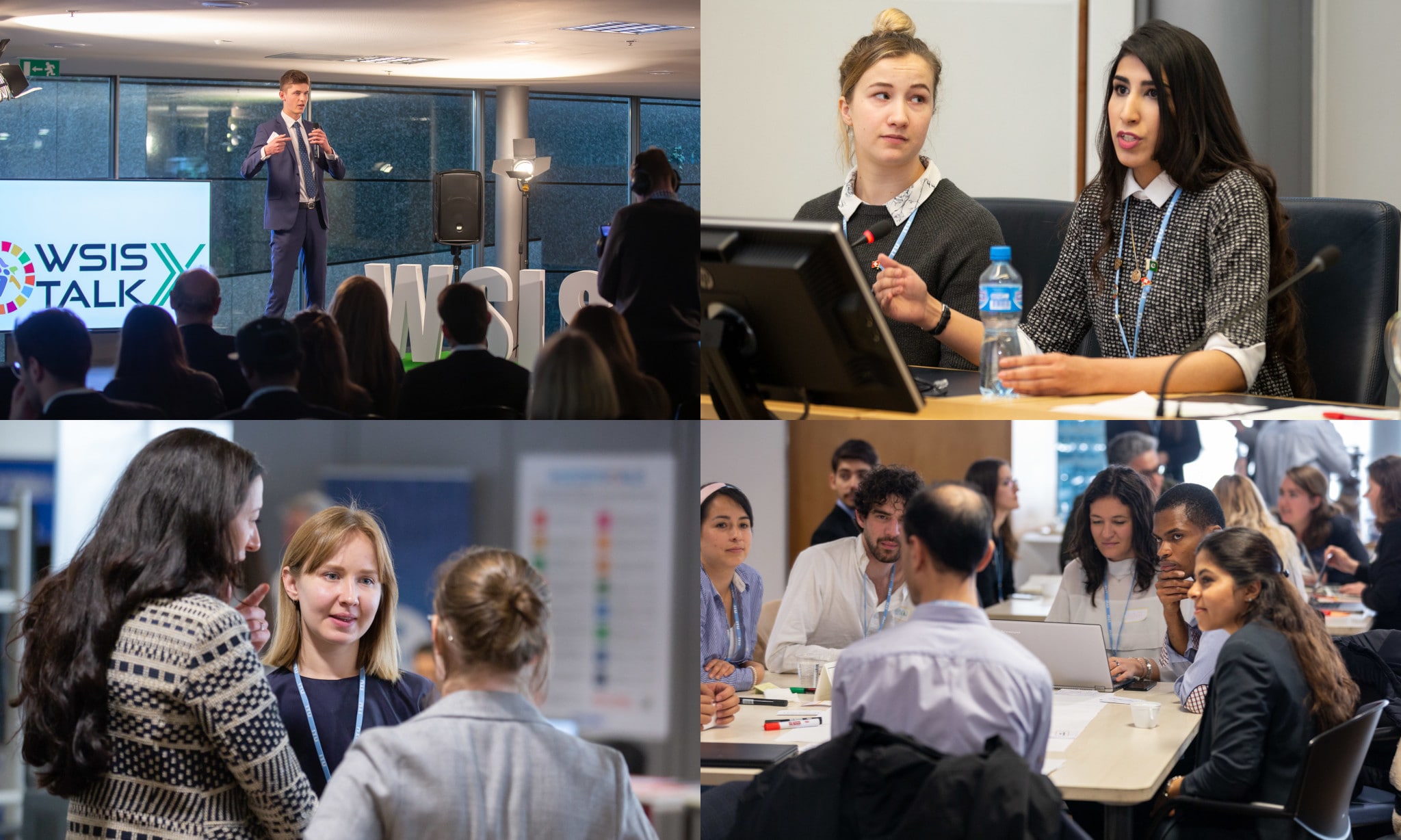ICTs and Youth

During the previous WSIS Forum events, we have been able to spark many youth communities and their representatives to join the discussions on the implementation of the WSIS process, and numerous youth-related sessions were held since 2009. Following the outcomes of the WSIS Forum 2017 and based on proposals by the youth representatives, in 2018 the Special Track on ICTs and Youth was launched. For the 5th year in a row, the WSIS Forum strives to provide young people and to representatives of youth communities with a platform to share and exchange their insights related to the information society and international development, including the United Nations 2030 Sustainable Development Agenda. Last year’s special track brought an understanding of how young people are using ICTs in the times of digital transformation and the ongoing Coronavirus pandemic, while striving to achieve the SDGs. There were more than 300 active participants from 40 countries during the WSIS Forum 2021 Special Track, and more than 1,000 since its launch.
Contributions from youth to the WSIS Forum 2021 were much appreciated by the WSIS multistakholder community, especially for inspiring other young people at the event to get more engaged in the ICTs and Youth special track. One such inspirational call to further improve the work of this special track has resulted with the launch of our WSIS Youth Campaigns.
Objectives
The WSIS Forum 2022 ICTs and Youth track aim to achieve a threefold purpose:
-
Raising awareness about the current WSIS Forum selected ICT-related issues and challenges among the global youth communities and beyond.
-
Creating a space for youth to network both amongst them and encourage partnerships between different stakeholders, including governments, private sector, civil society, academia, and youth communities around the world.
-
Empowering youth worldwide with equal gender and regional distribution so that they are better equipped in the implementation of sustainability and change, whilst promoting the indispensable role of ICTs in shaping the information society to better serve all stakeholders.
Call to Action:
We are looking for partnerships in all the activities below. If you or your organization would like to get involved in any of the activities below, submit your proposal to the ongoing Open Consultation Process and contact us at wsis-info@itu.int
Activities for the WSIS Youth Track
-
Prize Competition: Call for Ideas — Papers & Digital Media on Multilateralism, Sustainability, and Climate Change.
In collaboration with Geneva Model United Nations (GIMUN) and the University of Trento
-
Workshop: Green Technologies & Youth Empowerment, in collaboration with Geneva Youth Call and other stakeholders.
-
Mentorship Program: Empowerment of Young Women in ICTs at the occasion of the global celebrations of the International Girls in ICT Day.
-
e-Knowledge Café: Youth and Older Persons: How to improve the intergenerational dialogue in the era of ICTs, in collaboration with Global Coalition on Aging and other stakeholders.
Youth Empowerment through WSIS Process and ICTs
Young people have many ideas for innovative solutions and the drive to make a change, but it can be difficult for changemakers to make their voices heard and reach the right people to turn ideas into action. ICTs can be part of the solution. The speed and scale of digital innovations not only provide a growing number of opportunities for sustainable development, but ICTs are enabling ideas to be heard and scaled up globally.
During the previous WSIS Forum events, we have been able to spark many youth communities and their representatives to join the discussions on the implementation of the WSIS process, and several youth-related sessions were held that resulted in shaping and developing the Special Track on ICTs and Youth. We strive to provide young people and to representatives of youth communities with a platform to share and exchange their insights related to the information society and international development, including the United Nations 2030 Sustainable Development Agenda.
Youth today, defined by the United Nations as individuals “between the ages of 15 and 24… without prejudice to other definitions by Member States” will be at the age of 25 to 34 during 2030. Not only will they become the major stakeholders in the decade of 2030s, but they will also be the group most affected by the efforts towards a more sustainable society. It is in their interest to act, and one of the most powerful tools at their disposal, are the ICTs. We propose four means by which youth may be empowered by information technology, considering the varying degree of impact across regions and across different socio-economic groups. The topic addressed is vast, and the issues concerning SDGs that need to be addressed are numerous, complex, and interconnected.
ICTs as a means of expression for youth across regions, for young woman, and for other youth in socially disadvantaged groups. The role of media is essential in this respect, as it allows the “freedom of expression and plurality of information”
ICTs as a means of education, to increase awareness of youth worldwide of the potential impact they could have in achieving the SDGs, as well as providing them the necessary skills to do so.
ICTs as a means of facilitating coordination and organization of youth groups, thus leading to increased bargaining power of youth.
ICTs as means to entrepreneurship, a new way for youth to gain a living, with higher flexibility and inclusion.

WSIS Youth Campaigns
WSIS Youth Campaigns: Goals and Objectives
The WSIS Youth Campaigns strive to create a space for youth to network and share their vision for the efficient use of ICTs in enabling sustainable development, the challenges they might encounter on this path, and the solutions young people are already providing to their professional and personal communities. The activities of the WSIS Youth Campaigns aim to contribute to the purposes of the ICTs and Youth Track: increasing awareness, facilitating partnerships and collaboration, as well as youth empowerment. In addition, it aims to foster a community of talented, ambitious, and diverse youth groups, whose work will be exhibited via the WSIS Forum.
In the context of the WSIS Special Track on ICTs and Youth, the WSIS Youth Campaigns will strive to highlight the interplay between youth, ICTs and sustainability and how youth are using ICTs to scale up their ideas and solutions. Issues to be discussed are aligned with the WSIS Forum 2022 theme: ICTs for Well-Being, Inclusion and Resilience: WSIS Cooperation for Accelerating Progress on the SDGs. WSIS Youth Campaigns is a youth-related initiative, and it is of our greatest concern and interest to have gender-balanced activities with equal geographic representation.
Call to Action:
Nominate WSIS Youth Campaigners for 2022-2023: Nomination Form.
Activities related to WSIS Youth Campaigns
-
Round Table & Networking Session for digital climate organizations (Climate Action)
-
Round Table: Digital and Sustainable Transformations in Businesses (Sustainable Business)
-
2 Panel discussions on how ICTs can be used as tools to entrepreneurship (ICT Entrepreneurship)
-
Mentorship program for young women (Youth Empowerment)
-
Call for Videos from young entrepreneurs
Selected Topics and Expected Outcomes
WSIS Youth Campaign: ICTs & YOUTH EMPOWERMENT
This is both a goal and a means to itself. ICTs can be extremely powerful in tackling the following SDG goals through youth empowerment: Goal 4: Quality Education; Goal 5: Gender Equality; Goal 8: Decent Work and Economic Growth; Goal 10: Reduced Inequalities.
Youth who were previously disadvantaged socially, economically, or ethnically find themselves with new tools and means at their disposal to enter job markets that were previously not open to them. E-learning today can gain a wide range of competencies, such as languages, programming, graphic design: highly practical skills for future employment, all of which is rendered accessible to them at a low cost. Here, it is important to stress on “digital inclusion” – women and youth in developing regions can especially benefit from the use of ICTs to enhance their future.
WSIS Youth Campaign: ICTs & CLIMATE CHANGE
Listed as one of the most urgent issues that needs to be addressed within the scope of the SDGs is the issue of climate change. As the UN secretary said, “application of information and communication technologies (ICTs) to mitigate and adapt to climate change” is a “ray of hope”. Youth have the power to make the change: WSIS Youth Campaigns aim to build awareness amongst youth of the efforts that have already been done using tech to tackle climate change, and demonstrate the potential actions that can be taken by them. In addition, the WSIS Youth track aspire to create a virtual space where young change-makers in climate-related issues can meet, collaborate, and coordinate their actions, thus increasing the total impact that can be made by young actors. Finally, the youth track aim to provide training and information to those who would like to act for a more sustainable future yet do not have the means necessary to do so.
WSIS Youth Campaign: ICTs & BUSINESS
The business world is undergoing some important transformation in an era of digitalization, globalization, and shifting consumer values. Business models are being redesigned in the presence of technological innovations and the Covid-19 pandemic. There is an emerging group of young entrepreneurs who aspire to build companies that abide to their values of sustainability and thrive in the corporate context. Youth today have the tools, notably the ICTs, to create their own career path rather than following that of their ancestors or abiding to existing corporate structures. By encouraging exchanges between capable youth, fostering partnerships, setting up role models, the WSIS ICTs and Youth track aim to increase the bargaining power of youth in the job market, and contribute to the development of sustainable entrepreneurship.